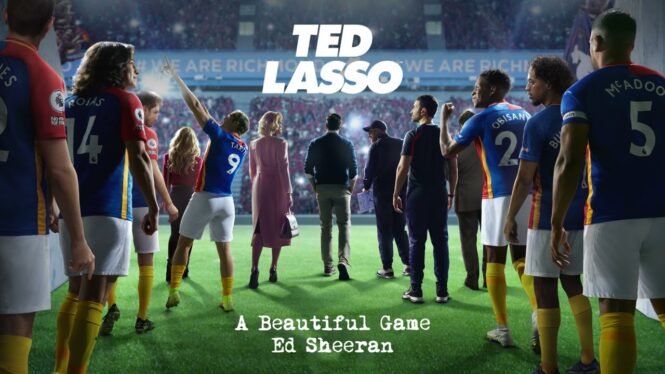When NBC sent her a brief seeking an upbeat anthem to kick off its 2023 college football season, BMG director of creative synch Laura Ogawa combed the publisher’s archives. She came up with “Here Comes Saturday Night,” a 2010 obscurity by Italian rock band Giuda, and NBC hired Fall Out Boy to cover it for the network’s B1G Saturday Night show as well as for NBC and Peacock fall broadcasts. “One time, they were playing it five times an hour,” Ogawa says. “The song worked to a T.”
“Here Comes Saturday Night” wasn’t the most lucrative synch in TV sports history — Fall Out Boy hasn’t released the full track, and even after the massive promotion ended, Giuda’s original had only 124,000 Spotify plays. But the prominence of such an obscure song in the first place illustrates the depth and diversity of the sports synch business, a huge part of the nearly $2 billion synch industry for labels and publishers. For publishers, Super Bowl synch fees on their own can rake in between $150,000 and $1 million. Last year, Sony Music Publishing scored 12 synchs during the broadcast, Universal Music Publishing Group had nine and Warner Chappell Music landed six or seven.
But beyond the Super Bowl, a broader universe of placements in the likes of NBA draft shows, MLB season openers, World Cup promotions and FIFA video game soundtracks adds up to endless opportunities. “The fees aren’t necessarily as competitive as they are on film or episodic TV, but it’s improving, and the promotional aspect, you can’t beat it,” says Jonathan Palmer, BMG senior vp of creative synch. “Five years ago, it wasn’t part of the intake process to ask new [song]writers, ‘Who’s your favorite team? What sport did you grow up playing?’ Now that’s part and parcel.”
In November, Warner Music Group arranged for Canton, Ohio, native Trippie Redd to premiere “Ok, Cool,” from his latest EP, Saint Michael V2, during a Cincinnati Bengals home game at Paycor Stadium; as part of the promotion — all documented on TikTok and Instagram — the rapper hung out on the field and met running back Joe Mixon. The label also placed Van Halen’s “Jump” in an ad campaign to kick off the Australian Football League’s 2022 season and aired Warner tracks, including ZZ Top’s “La Grange,” in the bumpers between the game and commercials during ABC’s recent College Football Playoff national championship game. “It’s a breadth of opportunity in terms of all sports,” says Ron Broitman, WMG executive vp of global synch and U.S. media licensing for recorded music.
Just as they compete to place tracks in ads, movies and TV shows, labels and publishers are constantly pushing songs from their catalogs for the right moments. Sometimes the song is extremely familiar: Hipgnosis owns most of the Journey catalog, for example, and the band recently performed “Don’t Stop Believin’ ” at a Formula 1 event; the song has also aired during German soccer matches. “We’re not going out buying catalogs [and] saying, ‘This could be used in an NFL show’ — but generally, they might be because the producer wants to use songs that everyone can resonate with,” says Tim Hayes, the company’s vp/head of U.K. and international synch. “We’re buying that catalog because there are 200 iconic songs in there.”
The process of creating a successful sports synch can be complicated — and unexpected. To create his song “A Beautiful Game,” co-written with Foy Vance and Max Martin for a 2023 episode of Ted Lasso, Ed Sheeran recorded crowd noise at one of his stadium shows for maximum soccer ambiance. The song won an Emmy Award in January, and Primary Wave, which represents Vance, is now aggressively marketing it for future sports placements. “We’ve got an incredible copyright. Hopefully, we start to get other artists to cover it,” Primary Wave president of global synch Marty Silverstone says. “Hopefully, it does have that sports DNA, and it’s something that really can take off.”
Sports synchs can be written specifically for a broadcast, team or event, but they can also be serendipitous — an artist puts out new music, a label or publisher notices it might work for pumping up crowds and the tracks take off on TV or online. “The real estate in sports programming is so massive that there’s a place for everything,” says Randy Shefer, Sony Music Publishing vp of creative marketing for interactive media, film and TV.
Case in point: In September, Fox Sports selected Thirty Seconds to Mars as its artist of the month, airing four songs from the rock band’s new album, It’s the End of the World but It’s a Beautiful Day, “across all their programming,” according to Jamin Mandel, associate director of creative synch for Kobalt, actor-frontman Jared Leto’s publisher. The album then hit No. 6 on the Top Album Sales chart in its first week. “It’s great to see the levels of artists that sports networks are willing to work with,” Mandel says. “It’s really a level playing field for all types of artists — as long as they make music that fits what the networks are looking for.”
This story will appear in the Feb. 10, 2024, issue of Billboard.



